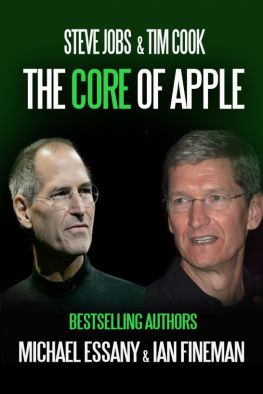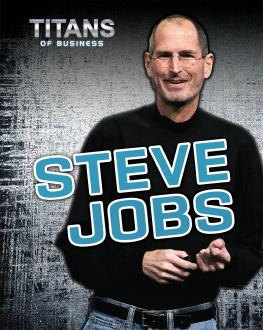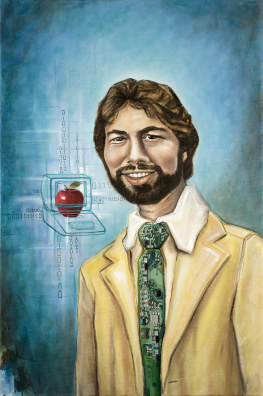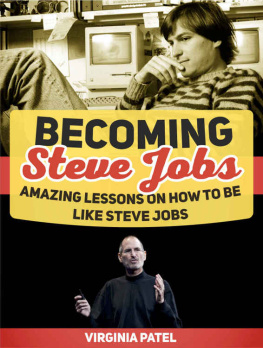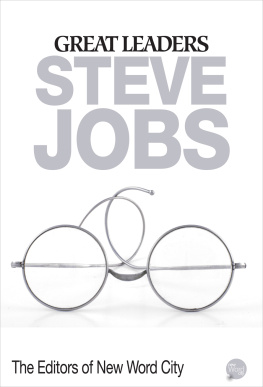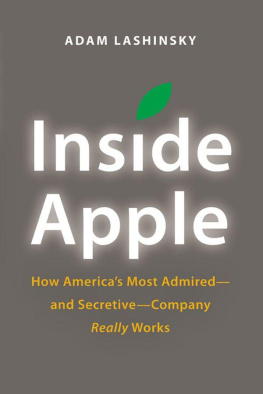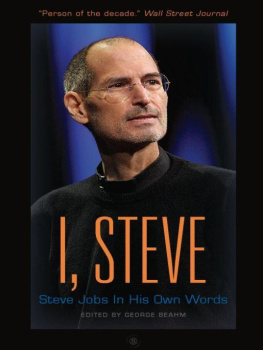Steve Jobs & Tim Cook: The Core ofApple
By Michael Essany and Ian Fineman
Disclaimer
Published by Sports Entertainment Publishingat Smashwords.
Copyright 2016 Sports EntertainmentPublishing.
All Rights Reserved worldwide. May not becopied or distributed without prior written permission from theauthor.
This eBook is not affiliated with or endorsedby Apple, Steve Jobs, Tim Cook, or any representatives thereof.
All information contained in this eBook hasbeen obtained by exclusive interviews, online research, andinformation freely available in the public domain.
This eBook provides information that you readand use at your own risk.
Cover image of Steve Jobs is available (withattribution) royalty free and for commercial use by James Mitchell on Flickr .
Cover image of Tim Cook is available (withattribution) royalty free and for commercial use by Valery Marchive on Flickr .
Sports Entertainment Publishing does notclaim ownership of cover photos, which may be used by others withproper source attribution as defined on their respective Flickrposting pages.
Tim Cook: The Core of Apple's Problem
By Ian Fineman | Published September 2013
Part 1: Tiny Tim
If Steve Jobs were alive today, he would beembarrassed by what Apple has become.
That's the admission of an Apple insider andformer Jobs' recruit, who claims the tech giant's dwindlingreputation as the greatest tech innovator of our time would mortifythe man who lived for groundbreaking innovation.
But the embarrassment, the source confesses,would mostly stem from issues of erroneous perception. As acompany, Apple remains a titan unrivaled by its peers in the mobilecomputing space. Fiscally, the company is every bit as healthy asit is responsible. Still a giant in a field of colossalcompetitors, Apple product releases are "events," each morecritically and commercially successful than previousgenerations.
Internally, the resounding majority if nottotality - of Apple employees and executives believe that Tim Cookwas, and still is, the "best man for the job" and the only logicalsuccessor Steve Jobs could have handpicked to run the company thathe and Steve Wozniak created in 1976.
While it may sound hypocritical given hisacceptance by Apples board and body of leaders, for as much as TimCook has drawn praise for his sound stewardship of the companyfollowing Jobs' death in October of 2011, he's also drawn fireinside and outside the walls of Apple's Cupertino, Californiaheadquarters.
Why? Some believe that Cook is exactlywhat Apple needs behind the scenes but not publicly.
Still mesmerized by the inspiring work andlegacy of Steve Jobs, Tim Cook is yet to earn the drone-likeaffection of those in the Apple universe that Jobs enjoyed.Perhaps, ultimately, that's an impossible task and one that noindividual could ever satisfy. But in Cupertino, today, some justcan't accept the not-so-charming or formidable Cook as thecompanys public figurehead. And it's causing issues that havespilled beyond the walls of 1 Infinite Loop.
Privately, some have allegedly taken tocalling Cook "Tiny Tim." While everyone at Apple respects Cook andhis ability to keep the company strong and a dominant marketleader, a few have ostensibly confessed that he doesn't lead in theinspiring fashion that Jobs used to.
It all boils down to fear, one former Appleemployee says.
"You were afraid to disappoint Steve [Jobs],"the source confesses. "It was like a child wanting the elusiveaffirmation of a difficult-to-please parent. You wanted to makeSteve happy. You believed in his vision. You wanted to besuccessful for yourself but mostly for Steve and for Apple. It'sdifferent now. The personalized element of success is not the same.Im not saying its gone. Im saying it isnt the same. No one isafraid of Tim. No one is going to be berated in the conferenceroom, left trembling by a verbal scourge. Fear born of love oradmiration is a powerful motivator. But it's lacking now. And thepublic has sensed the same."
Indeed, Tim Cook an otherwise intelligent,sensible, responsible leader still appears intrinsically small inthe shadow of Steve Jobs. And it's likely impacted some degree ofconsumer and investor confidence in the company.
"I truly believe," the source says, "that alot of people didn't buy Android or BlackBerry devices after theiPhone because they respected Steve Jobs too much to leave the iOSecosystem. Those bonds between consumer and company have grown moretenuous.
Simply put, Tim Cook is still seen as SteveJobs placeholder, not his replacement.
And that's Apple biggest problem- if you evenwant to call it a "problem" - today. It's perception. Tim is doingan amazing job. But he is not a big talker - a braggart. He isarguably just as creative and farsighted as Steve, as hard as thatmay be for some to admit. Let's not forget, of course, that Tim wasSteve's guy. Steve knew Tim could do this. And though Steve wouldlikely be embarrassed by Apple's diminished reputation today, hewouldn't blame Tim Cook for it."
Others at Apple, however, may feeldifferently. They assert that Apple has always been about image.And if Apple's image seems weak or uninspiring, then Cook shouldlead behind the scenes while others step up publicly to introducenew Apple products and keynote major company events and industryconferences.
By all accounts, Tim Cook is exceedingly morethoughtful than Steve Jobs ever was. While Jobs often jumpedhead-first into ideas - most of which were brilliant, others not -Tim Cook is methodical in his commitment to innovation. This is whyApple has developed a reputation in the last 24 months for beingslow to innovate. Apple is, in fact, making progress. It's just nothappening on an expedited time table.
Cook lets ideas simmer, stew, and sit for awhile. He has a multi-year plan. And while investors may want tosee more products emanating from Apple's pipeline on a more routinebasis, Cook doesn't easily succumb to pressure. And he won't strayfrom his plan to accommodate those who are simply too restless forApple to show us what's next. Cook will show us what's next, Applesources say, when the conditions are right and the products areperfected by Tim's assessment and estimation.
Anyone who has worked closely with Tim Cookand Steve Jobs will tell you that neither man is more aperfectionist than the other. Each is cut from the same cloth.
But Cook's methodical approach to productdevelopment and launch has been frustrating to some at Apple, andespecially Apple's board. Though most who have seen Apple'spurported ten year plan - an anticipated or projected productdevelopment and release calendar - is "dazzling" and would knockthe socks off of Jobs (who reportedly had a hand in the calendar'searly development), the publics unending quest for instantgratification and incessant innovation isn't being catered to bytoday's Apple.
And whether he wholly deserves it or not, TimCook is at the core of Apple's problem - its public relationsproblem. Because, really, that's all that it is. In terms ofbusiness itself, Apple is still a beast of epic proportions.
In July 2013, once again amidst bleak WallStreet expectations, Apple announced staggeringly impressivefinancial results for its fiscal 2013 third quarter. The companyposted quarterly revenue of $35.3 billion and quarterly net profitof $6.9 billion, with international sales accounting for 57 percentof the quarters revenue. Apple even sold a record number ofiPhones for the June quarter.
We are especially proud of our record Junequarter iPhone sales of over 31 million and the strong growth inrevenue from iTunes, Software and Services, Cook said at the time.We are really excited about the upcoming releases of iOS 7 and OSX Mavericks, and we are laser-focused and working hard on someamazing new products that we will introduce in the fall and across2014.

